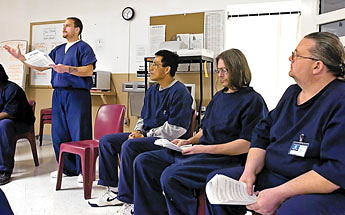|
Program helps inmates SOAR

Waits Donald points out other inmates who did a good job the past
week during a Therapeutic Community meeting at the Grants Correctional
Facility on Wednesday afternoon. This group of inmates is classified
as Level Two's. They are awarded with more freedom than other inmates
due to their good behavior. [Photo by Matt Hinshaw/Independent]
By Mike Marino
Cibola County Bureau

Inmate Rocky Ruiz repairs one of the many gates at the Grants
Correctional Facilities on Wednesday afternoon. Rocky is one
of the inmates at the state prison who is learning a trade while
paying his debt to society. When Rocky finishes serving his
time he can apply the skills he learned at the prison to a career.
[Photo by Matt Hinshaw/Independent] |
GRANTS — The American prison system is filling
to capacity with the incarcerated who have committed crimes from
rape to murder to child molestation and any number of other crimes
that society has deemed illegal and anti-social.
The prison system originally was referred to as "the penitentiary"so
the prisoner could have time to reflect on his or her crimes and
become penitent before being released at some time back into the
mainstream of society.
Many convicts may have become truly penitent and successfully returned
to society; however, they usually lacked proper skills or training
to allow them to contribute to the society that had decided to give
them a second chance. Unfortunately, some would eventually resort
to their old criminal habits and end up going back to "the
big house." Recidivism became rampant and reform was minimal
at best.
Today's enlightened approach to incarceration believes in providing
inmates with skills to aid them in life after release, thereby removing
the potential for further criminal activity once they are back in
the community.
The Western New Mexico Correctional Facility which opened in 1984
has a 428-bed capacity with a daily average of 409 prisoners. At
a cost of $28,051 per year per prisoner it makes good economic sense
to provide programs and services to give these prisoners marketable
job skills and to help them attain legitimate economic self-sufficiency.
One of the major elements in this ongoing program is called Project
SOAR, or Success for Offenders After Release. SOAR is a partnership
between the New Mexico Corrections Department and the New Mexico
Department of Labor. Kathy Elkins, Project SOAR coordinator said,
"SOAR participants enroll in our cognitive education programs
which are designed to change their previous value systems and destructive
and criminal behaviors. It's basically a program designed to reduce
recidivism."
The success rate for the SOAR program is impressive too. Elkins
said, "Of the 764 SOAR participants who have been released
so far the recidivism rate is around 29 percent. As for employment,
we get figures from parole officers and the numbers are showing
a 70 percent employment rate for SOAR participants."
Deputy Warden James Lopez talked about treating the whole individual.
Lopez said, "We try to get the inmate to think and act responsible.
Some inmates truly want to change and we provide the tools to accomplish
that goal, to make them more productive and less destructive."
Other programs available to inmates are educational such as attaining
a GED, Special Education, Literacy and English as a Second Language.
Vocational training is also available where inmates can learn skills
from plumbing and electrical to masonry, auto mechanics and computer
repair. Skills that will aid them in gaining employment in well-paying
careers once they have completed their sentence.
Lopez said, "There are companies willing to hire these inmates
on release. The Department of Corrections does contract work with
private companies such as Arrowmark, an international food service
company. We've contracted with them to do a program here called
'Inmate to Workmate,' which is an eleven week course. The inmates
work in the kitchen and have a course in food preparation and all
that is necessary in a kitchen including culinary arts. The inmates
eventually graduate and upon release. Arrowmark will hire many of
these individuals in the food service sector. Not in the prisons
obviously."
Other programs include anger management, self-esteem group workshops,
mentoring programs, arts, parenting skills and family dynamics.
One of the vocational training areas is plumbing and one inmate,
Ronnie "Red" Lusk, entered the prison system at the age
of 18 with more than a small chip on his shoulder after being convicted
of armed robbery. Now 21, Lusk has turned his life around and has
become a model prisoner. He plans to pursue a career in plumbing
when he gets out and returns to the Albuquerque area.
Lusk said, "I changed my attitude 18 months ago when I started
learning a good trade. Became preoccupied with it and got away from
everything else negative. Right now I'm making .40 cents an hour,
but when I get out and get a plumbing job and maybe earn thirty
bucks an hour or somewhere around there." Lusk also had some
words of advice, "Anybody can change. It's all in your head;
just go with your heart."
|
Thursday
March 8, 2007
Selected
Stories:
Misread
ballots force election hand-count
Where will session
meet?; Confusion reigns
Program
helps inmates SOAR
Celtic Festival
theme is multi-cultural this year
Deaths
|



